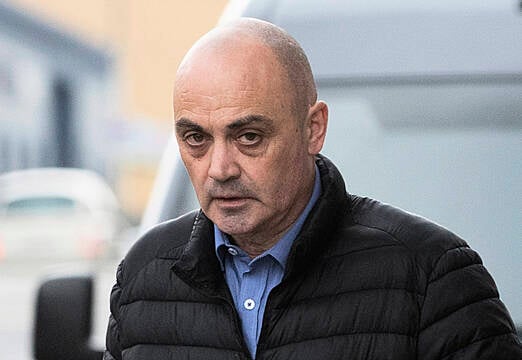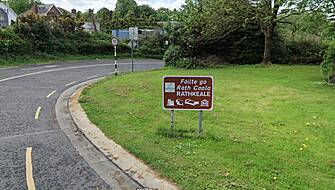A man who repeatedly raped a nine-year-old girl in the late 1980s, telling her it was their "secret", has appealed his convictions arguing that a delay of decades in the prosecution of his case meant his trial was unfair.
Declan Hannon (52) was convicted at the Central Criminal Court in April 2019 of the rape of the child on four occasions and of two counts of indecent assault at an address in Enniskerry, Co Wicklow, in 1987.
Due to the collapse of a number of trials the victim, now aged in her 40s, had to give evidence six times in court before her attacker was finally convicted.
Hannon, of Ramsgate Village, Gorey, Co Wexford, had pleaded not guilty but was found guilty by a jury on all six counts and sentenced to seven years' imprisonment by Mr Justice Michael White in May 2019.
Hannon first raped the girl in a shed during a game of hide-and-seek when he was 17 and raped her three more times during a summer in or around 1987 to 1989 when he told her not to tell anyone as it was their "secret".
Hannon also raped the girl on waste-ground next to his family home in Enniskerry, then again next to a backyard mobile home and again on the floor of the boys' bedroom in his family home.
In sentencing, Mr Justice Michael White said that Hannon carried the "brutal and cynical rape of an innocent child".
In November 2020, the woman won a legal battle at the Court of Appeal to have Hannon publicly named, overturning a gagging order made by Mr Justice White during the trial.
Gag order
Mr Justice White's order prevented the publication of both the victim and her abuser, but the Court of Appeal ruled that the order “was superfluous and ought not to have been made”.
Mr Justice White said he made his order "at the request of the DPP and the complainant". However, the DPP then appealed the order after the woman contacted them to say that she wished to waive her right to anonymity and for Hannon to be named. In response, Hannon's lawyers made an application to say the victim had no legal right to waive her anonymity.
That Court of Appeal judgement agreed with the DPP, who had submitted that “in the absence of any familial relationship, the publication of the name of the accused would not, at this stage, tend to identify the complainant”.
Speaking outside of court in 2019, the victim said she was never asked by the DPP at the sentencing hearing about her wishes and did not know she had to address the question of her anonymity.
At the trial, the woman, now a married mother, said she had to think long and hard about coming forward when she was approached by gardaí in 2013 regarding the 1987 offences.
She said she had tucked away the "horror" of what had happened but ultimately decided to come forward “to right this horrible wrong.”
At the Court of Appeal on Wednesday, Colman Fitzgerald SC asked the court to consider the question of delay prejudicing Hannon, making his trial unfair.
Mr Fitzgerald said that the complainant did not indicate in which of the three years — 1987, 1988 or 1989 — the rapes took place, but the trial had focussed on 1987. Mr Fitzgerald said the prosecution's delay "significantly prejudiced" Hannon in defending himself.
Mr Fitzgerald said Hannon's father died in 2006 and that this, alongside the condition of his mother who was medically unable to give evidence at the trial, deprived Hannon of two possible witnesses.
On the allegation of rape relating to the shed, Mr Fitzgerald said that Hannon's father kept the shed permanently locked unless he was present, something that could have been confirmed had he been still alive.
He said that there was conflicting evidence on the locations of the rape allegations in whether there was a hedge or a two-wire fence bordering the mobile home in 1987, where the complainant said one of the attacks occurred.
He said this distinction went to the core of the case regarding the credibility of the witness who was accusing Hannon of "covert, secret" offences.
Mr Fitzgerald said that work records for Hannon from the Powerscourt estate, where he worked as a tree surgeon and labourer, were also no longer available to the defence.
'Significant evidence'
Mr Fitzgerald noted that it had been 11 years between the victim's initial complaint to when she made a formal statement to gardaí in 2013, in which time "significant evidence" could have been lost.
The barrister said that there was also evidence of "untruthfulness" uncovered during legal argument when the victim could not say to her counsellor that she was certain had been penetrated by Hannon on the occasions.
Ms Justice Úna Ní Raifeartaigh said the victim had already explained that she was afraid the counsellor would not believe her if she said she had been raped.
Mr Fitzgerald said that this admission came out during the trial and that if the defence knew of it in advance, they would have devised a line of cross-examination beforehand on the matter.
Paul Murray SC, for the State, said the case was not one of "vague, unsubstantiated allegations". Mr Murray said the complainant was "very clear" about the four incidents and that the allegations did not come "out of the blue", as it was first the subject of an investigation in the 1990s.
He said evidence had been given by both Hannon and his brother that they had access to the keys to the shed while their father was at home.
Mr Murray said that all matters regarding delay had been "fully ventilated" at the trial and that the trial judge ultimately found that delay did not prejudice the defence.
Mr Murray said that with regard to the 1987 lay-out of the locations where the offending occurred, there was "no doubt about what place" they occurred.
Mr Murray said that when the defence had their chance to ask for more time regarding the untruthfulness, they instead recalled the complainant and cross-examined her.
Presiding judge Mr Justice John Edwards said the court would reserve its judgement in the matter.
If you have been affected by any of the issues raised in this article, you can call the national 24-hour Rape Crisis Helpline at 1800 77 8888, access text service and webchat options at drcc.ie/services/helpline/, or visit Rape Crisis Help.
In the case of an emergency, always dial 999/112.







